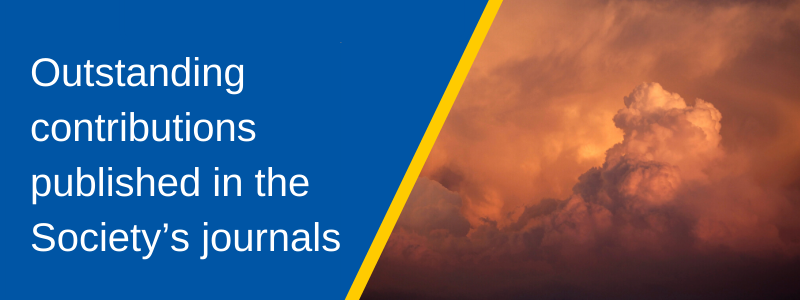

Awards and Prizes for outstanding contributions published in the Society’s journals
The Buchan Prize is awarded annually to members of the Society for a paper or papers published in the previous five years in the Quarterly Journal, the International Journal of Climatology or Atmospheric Science Letters and adjudged to contain the most important original contribution or contributions to meteorology.
The Adrian Gill Prize is named after the Australian meteorologist and oceanographer. It is awarded annually to a member of the Society who has made a significant contribution, in the preceding five years and in the specified fields, and who has also been an author of a paper(s) in the Society’s journals. The specified fields are those that interface between atmospheric science and related disciplines. These related disciplines include oceanography, hydrology, geochemistry and numerical methodologies.
2019 Awards & Prizes
- Distinguished work and careers
- Outstanding contributions published in the Society’s journals
- Original research, innovation and significant contribution to meteorology and its application
- Original contributions of early-career scientists
- Outstanding contribution in public outreach and communication
- Outstanding contribution or service to the Society or the Society’s journal Weather
- Journal Editor's Awards
Resources
Buchan Prize
Professor Adam Scaife

Professor Adam Scaife is the very worthy winner of the 2019 Buchan Prize having gained an international reputation as an outstanding scientist because of his numerous pioneering and important publications, many in Royal Meteorological Society journals. These have ranged from atmospheric dynamics to long-range forecasts, the latter particularly on the mechanisms of long-range atmospheric predictability. Professor Scaife is a Principal Fellow and Head of Monthly to Decadal Prediction at the Met Office and Professor of Mathematics at the University of Exeter. His work in these roles combines deep scientific insight, a strong background in climate dynamics and a practical outlook. This highly effective combination, especially given the remit of the Met Office, is well reflected in his considerable range of influential contributions to Society journals over the last 5 years.
In this period Professor Scaife has published a body of work demonstrating the major mechanisms of long-range predictability for United Kingdom (UK) and European winters. A particularly influential lead authored Quarterly Journal of the Royal Meteorological Society paper (2017) showed how tropical rainfall fluctuations from one year to the next, and the related mechanisms, are highly predictable at seasonal lead times. These mechanisms explain a large proportion of winter seasonal prediction skill in the Atlantic region via the North Atlantic Oscillation. Another well cited paper in Atmospheric Science Letters (2016) demonstrates the crucial role of stratospheric teleconnections in providing additional winter extratropical forecast skill. A recent lead authored paper in Atmospheric Science Letters (2019) shows that a relatively large increase to around 10km resolution leads to a considerable increase in transient eddy influences on mid-latitude flow, so that modelled eddy feedback on the North Atlantic Oscillation approaches the much higher values seen in observations. This finding may contribute to solving the year-round signal to noise paradox seen in many climate models, first uncovered by Professor Scaife and co-workers in 2014. This is generating much international interest as it likely applies to all time scales, from monthly forecasting to climate change.
Professor Scaife has also published a number of papers in Society journals on the practice of long- range forecasting and forecasting skill. In particular, following his demonstration of the importance of tropical rainfall variations, he compared tropical rainfall prediction skill estimates from leading forecast systems in the International Journal of Climatology (2019) and pointed out avenues for improvement. Professor Scaife has also authored a number of papers on the practical use of real time seasonal forecasts for Europe and the UK, the East Asian summer monsoon and tropical cyclones.
Professor Scaife is a well-recognised international leader in climate science. He has co-chaired the World Meteorological Organisation’s International Working Group on Seasonal to Interannual Prediction and the World Climate Research Program’s Grand Challenge on Near Term Climate Prediction. In the 5 years covering this award he was awarded the Copernicus Medal (2018), the American Geophysical Union Ascent Award (2016) and the Royal Meteorological Society’s Adrian Gill Prize (2014). He has published over 150 peer reviewed papers with a Web of Science h-index of 51 and was listed in 2019 as a Clarivate “Global Highly Cited Researcher”.
|
|---|
Adrian Gill Prize
Professor Ken Carslaw

Professor Ken Carslaw has been awarded the 2019 Adrian Gill Prize for his eminence in atmospheric science research and aerosol modelling. Professor Carslaw’s research, integrated using novel numerical models and statistical methods, brings together the fundamental chemistry and physics of particles with atmospheric dynamics and cloud processes. His research takes evidence from the laboratory and applies it to the local and global scale. Professor Carslaw has made notable major contributions to this field of research within the last five years and throughout his career.
Professor Carslaw received his PhD in 1994 and has had an outstanding career working across atmospheric physics and chemistry. He has made fundamental discoveries in the physical processes of aerosol formation, and has applied these discoveries to numerical models used for weather and climate prediction. In particular, he has pioneered and led the development of the UK’s global aerosol modelling capability. He leads one of the world’s top research groups in this field and is leading the UK’s contribution to national and international aerosol-clouds-climate modelling programmes. More recently he has played a key role in the team making fundamental discoveries on aerosol nucleation at CERN. He has been an International Scientific Indexing (ISI) highly cited researcher for several years. He won the American Geophysical Union (AGU) Ascent Award in 2014 as was awarded an AGU fellowship in 2019.
His early research led to the discovery of liquid polar stratospheric clouds and the role of large polar stratospheric cloud particles in Arctic denitrification. His group was among the first developers of a global model of aerosol microphysics (GLOMAP) which is now part of the UK Earth System Model. His research with GLOMAP established that new particle formation accounts for around half of climate-relevant aerosol particles in the atmosphere. In the CERN CLOUD experiment his research led to several breakthroughs in understanding the mechanisms of new particle formation, which has allowed him to build the first global model of this process based entirely on laboratory measurements, a status achieved for gas-phase chemistry over thirty years ago. His group has a wide interest in natural aerosols and he has shown them to be a major neglected component of the uncertainty in anthropogenic aerosol radiative forcing. Most recently, in collaboration with Professor Ben Murray’s lab, he has developed the first global model of ice-nucleating particles based solely on laboratory measurements of their physical properties. While continuing to explore interesting aerosol processes, his group increasingly focuses on quantifying and reducing model uncertainty, which he does by applying novel statistical techniques to generate unprecedented information about the causes of global aerosol and cloud model uncertainty.
Collectively, Professor Carslaw's influence on the field of atmospheric science has been to bring aerosol physics from the margins, into the heart of climate understanding and climate modelling. This body of work has transformed our operational models for weather, climate and air quality modelling, and our appreciation of uncertainties in projections of climate change. He is to be congratulated as a worthy winner of the 2019 Adrian Gill Prize.
|
|---|

